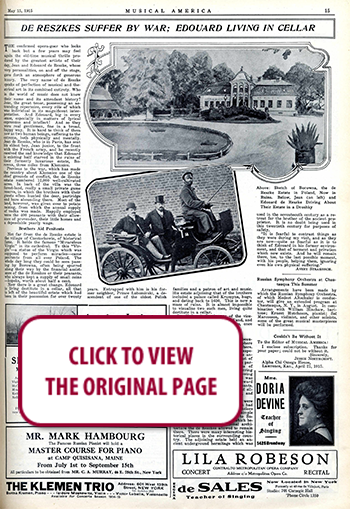 100 YEARS AGO...IN MUSICAL AMERICA (89)
100 YEARS AGO...IN MUSICAL AMERICA (89)
May 15, 1915
Page 15
DE RESZKES SUFFER BY WAR; EDOUARD LIVING IN CELLAR
THE confirmed opera-goer who looks back but a few years may feel again the old-time musical thrills produced by the greatest artists of their day, Jean and Edouard de Reszke, whose very personalities, on and off the stage, gave forth an atmosphere of generous luxury. The very name of de Reszke speaks of perfection of musical and theatrical art in its combined entirety. Who in the world of music does not know their name and its attendant history? Jean, the great tenor, possessing an astounding repertoire, every rôle of which was individual in its magnificent interpretation. And Edouard, big in every sense, especially in matters of lyrical expression and intellect! And so they were real gentlemen, fine in a broad, happy way. It is hard to think of them now as two human beings, suffering to the extreme, both physically and mentally. Jean de Reszke, who is in Paris, has sent his eldest boy, Jean junior, to the front with the French army, and he recently received the sad knowledge that Edouard is existing half-starved in the ruins of their formerly luxurious estate, Borowna, three miles from Klomnice.
Previous to the war, which has made the country about Klomnice one of the chief grounds of conflict, the de Reszke estate numbered 12,000 well-cultivated acres. In back of the villa was the forest-land, really a small private game reserve, in which the brothers with their guests often hunted the deer, partridge and hare abounding there. Most of the land, however, was given over to potato raising, from which the annual supply of vodka was made. Happily employed were the 400 peasants with their allowance of provender, their little homes and a dependable yearly wage.
Brothers Aid Penitents
Not far from the de Reszke estate is the village of Czestochowie, of historical fame. It holds the famous “Miraculous Virgin” in its cathedral. To this “Virgin”—a statue of the Virgin which was supposed to perform miracles—came penitents from all over Poland. The whole day long they could be seen passing by Borowna, often being spurred along their way by the financial assistance of the de Reszkes or their peasants, who always kept a supply of small coins—kopeks, worth about half a cent.
Now there is a great change. Edouard is living destitute in a cellar, all that is left of the beautiful estate which had been in their possession for over twenty years. Entrapped with him is his former neighbor, Prince Lubomirski, a descendent of one of the oldest Polish families and a patron of art and music. His estate adjoining that of the brothers included a palace called Kruszyna, huge, and dating back to 1630. This is now a mass of ruins. It is almost impossible to visualize two such men, living quite destitute in a cellar.
Dr. Holbrook Curtis, one of the vice-presidents of the Polish Relief Fund, and an old friend of the de Reszkes, once visited them at Borowna.
Devotion of Their Peasants
“I remember it as it was then, a beautiful peaceful home with an atmosphere unlike any I have ever known elsewhere. The night of our arrival was an especially auspicious occasion, being the annual celebration known as the ‘Feast of the Crops.’ In this the two brothers participated, responding to the gifts of fruits and sweets, and to the stirring speeches and songs. The days following I was shown about the estate, and was continually impressed by the outward signs of devotion shown by the peasants. They would walk shyly forward and silently grasp their master’s .hands, and kiss them.
“The homes of these peasants were very interesting. The married men had little individual huts, and the bachelors boasted a long low building of simple neat lines. Near the entrance to Borowna stood a very old church, which because of its distinctive national architecture the de Reszkes allowed to remain there. There were many interesting historical places in the surrounding country. The adjoining estate held an ancient underground hermitage which was used in the seventeenth century as a retreat for the brother of the ancient proprietor. It is no doubt being used in this twentieth century for purposes of safety.
“It is fearful to contrast things as they were during my visit, and as they are now—quite as fearful as it is to think of Edouard in his former environment, and that of torment and privation which now exists. And he will remain there, too, to the last possible moment, with his people, helping them, ignoring even his own physical suffering.” —AVERY STRAKOSCH.




 RENT A PHOTO
RENT A PHOTO





